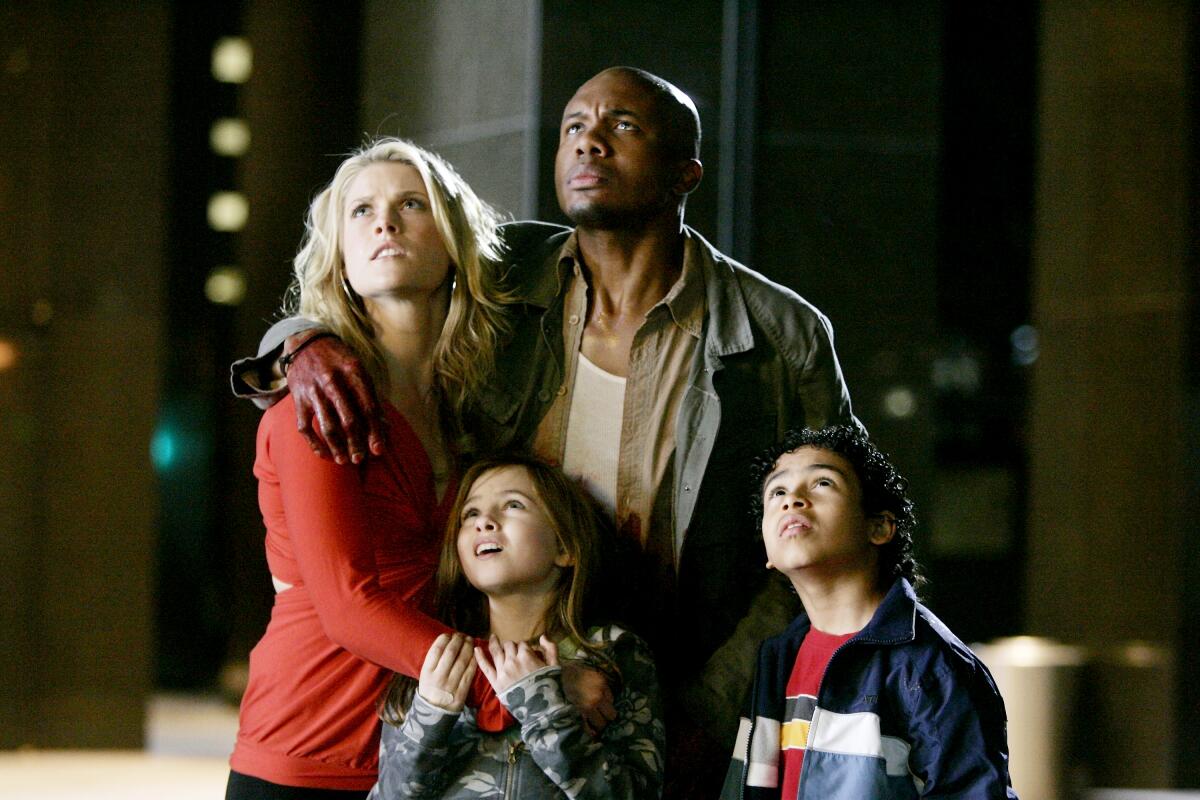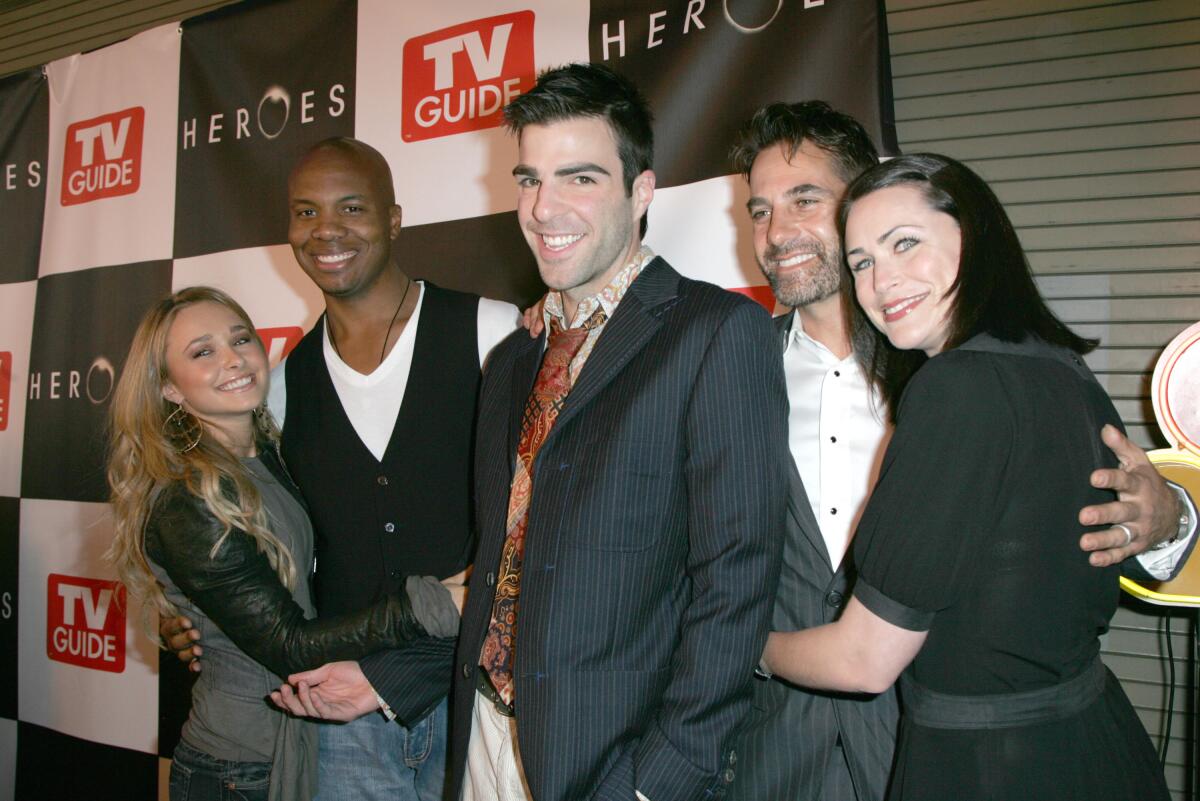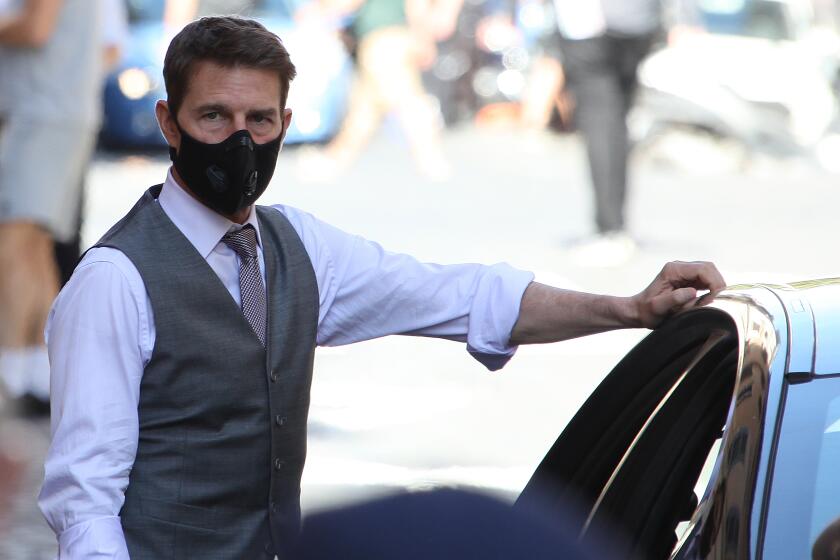Actor Leonard Roberts says race was a factor in his ‘Heroes’ departure

Leonard Roberts has revealed the struggles he endured in his first series-regular acting role on the hit TV show “Heroes,” which he considers race-related. And former costar Ali Larter has issued an apology, noting that his account “absolutely doesn’t match my memory nor experience on the show,” which ran on NBC for four seasons from 2006 to 2010.
“Drumline” star Roberts played D.L. Hawkins, husband to Larter’s Niki Sanders, in the first season of the series, which was a giant springboard to success for many in its cast, including Milo Ventimiglia, Zachary Quinto, Masi Oka and Hayden Panettiere. Roberts’ character was killed off, off-camera, after the first season.
In an essay published Wednesday by Variety, the Black actor confirmed a tense working relationship — as had been alleged in a blind item at the time — with Larter, who is white. When disagreements about the direction of scenes arose, Larter chose not to involve her scene partner in discussions with those who were in charge.
Roberts also called out a lack of Black writers on a show that started with three Black leads and cited that as a reason why his thoughts on his character were never sought out. Many of his white costars had been consulted regarding theirs, he said.
Tom Cruise’s rant at crew members who violated COVID-19 safety measures on the set of “Mission: Impossible 7” was profane and a little over the top. But he said what many of us are thinking. All the time.
The actor related details of a meeting he had with “Heroes” creator-showrunner Tim Kring and executive producer Dennis Hammer after learning that his character was being written off the series.
“Kring began by reiterating that because of my co-star, he just couldn’t make my remaining on the show work story-wise.” Roberts wrote. “I’m typically not one who refers to himself in the third person, but in that instance I ... pointed out he fired Leonard Roberts, but only mentioned Leonard Roberts’ co-star as the reason for his firing, and that Leonard Roberts found that … curious.”
Kring said Roberts’ character had been “painted into a corner” due to the lack of chemistry with Larter — something the actor found hard to believe on a show with a wildly creative concept.

Then, Roberts wrote, “Hammer stepped in. He said he needed me to know I was ‘loved’ and my co-star was ‘hated’ by many for her behavior, saying it as if I would join in. I didn’t; I just wanted to be able to do my job and do it well. Hammer then made it clear he would deny what he said if I went public with said revelation. I pointed out it was absurd to hear that, given that when the meeting concluded, my co-star would be the one still with a job and I would be the one painfully unemployed. Hammer said I needn’t worry, suggesting I would undoubtedly move on from ‘Heroes’ and still be working in 10 years,” Roberts continued.
“‘Don’t think of this as a situation where the Black man loses and the white woman wins,’ Hammer said.”
Larter apologized several hours after Roberts’ essay was published, saying in a statement to TVLine that she was “deeply saddened” by her former co-star’s experiences on the show.
“I am heartbroken reading his perception of our relationship, which absolutely doesn’t match my memory nor experience on the show,” the actress said. “I respect Leonard as an artist and I applaud him or anyone using their voice and platform. I am truly sorry for any role I may have played in his painful experience during that time.”
Roberts’ revelations were supported by 10 people who either worked on “Heroes” in 2006 or were familiar with his experiences at the time, Variety editors said in a note accompanying the essay. Larter did not comment before publication, the outlet said, but Kring and Hammer praised Roberts and didn’t dispute his accounts.
As of Thursday morning, none of the actors’ other “Heroes” costars had chimed in via social media.
In his essay, Roberts reflected on coming to terms with how his situation was perceived by people of different races: Black people identified with a system that made them feel invisible. White and non-Black people chalked it up as a “tough break” driven by artistic concerns.
“To constantly feel I had to prove not only the validity, but the very existence of racism before I could even own my feelings about it only added to my frustration,” he wrote.
“Weeks after my last ‘Heroes’ episode, one of my castmates, with no irony, said, ‘Can you really say you lost your job because you’re Black? C’mon, man. They’re gonna always keep the hot blonde on the show. That’s just Hollywood.’ I responded that for him, as a white man, to ask me to deny I lost my job because I was Black, but accept my co-star kept her job because of attributes he clearly believed identified her as white was, in fact, a quite literal embodiment of systemic racism. There always seemed to be a collective need for a more palatable justification of what I went through.”
Though Roberts didn’t respond publicly to Larter, he noted the Twitter observations of actress, comic and TV host Yvette Nicole Brown.
“[Larter] surely never even thought about the toll her privileged shenanigans were taking on Leonard. That non-apology proves she’s learned nothing since then,” Brown tweeted Wednesday. “People like her never do.
To Roberts, Brown wrote, “Brother, I see you. And I believe you. I’ve been there & I’m so sorry you had to go thru that. I’m sorry that so many of us have to. But every one of our stories we boldly share reveals what this industry is truly like when you have copious amounts of melanin.”
More to Read
The complete guide to home viewing
Get Screen Gab for everything about the TV shows and streaming movies everyone’s talking about.
You may occasionally receive promotional content from the Los Angeles Times.








